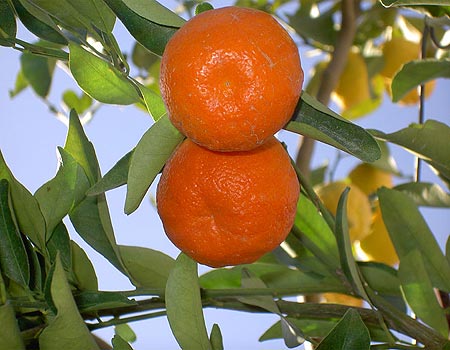 Israeli tangerines Photo: Ala Shalabiyyeh
http://www.ynetnews.com/articles/0,7340,L-3672498,00.html
Lawsuit: Spain stole Israeli fruit
Israeli tangerines Photo: Ala Shalabiyyeh
http://www.ynetnews.com/articles/0,7340,L-3672498,00.html
Lawsuit: Spain stole Israeli fruit
Dudi Goldman
Published: 02.16.09, 14:53 / Israel Money
Citrus Growers Association files lawsuit against Spanish growers accused of stealing branches of patented Israeli development of new tangerine species, costing local growers some $49,000 a year
Throughout the world, Israel is considered a superpower when it comes to the development of new citrus fruit species, but now, Israeli farmers are accusing their Spanish counterparts of stealing a new species, and have recently filed a lawsuit against them.
Commercial spying attempts have lead the developers of the new species to grow their fruits in hidden fields, "but afterwards the species grew in an open orchard," said Chai Benyamini, secretary-general of Israel's Citrus Growers Association.
"The Spanish send people who enter the orchard for a minute, cut off a citrus branch from the new species, and send it to Spain, and this is how we lose some NIS 200,000 ($48,900) a year," he explained.
The main species in question is a new breed of tangerine, called Or, that was developed in Israel and has been patented.
Advantages of the new seedless species include a better taste, a thinner peel that can be removed more easily and quickly, lower water requirements, and a longer shelf life.
Last year some 25,000 tons of the new fruit were marketed and valued at some $25 million.
Thanks to its many advantages, the new species has become popular in supermarkets throughout Europe, but since the development was patented by Israel, European retailers must purchase it from Israel or from companies that have bought the rights to market the product in Europe.
"The species is currently planted on an area of 20,000 dunum (about 5,000 acres) in Israel," said Tal Amit of Israel's Plants Council.
According to Amit, the council filed lawsuits in Spanish and French courts, and a trial is currently underway in France against Spanish agents accused of stealing the Israeli species and trying to grow it themselves.




